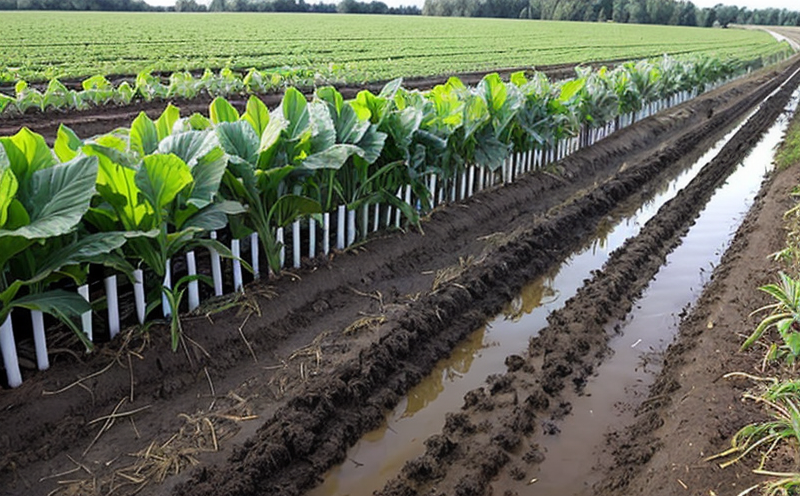ISO 8288 Iron Test in Agricultural Runoff Water
The ISO 8288 standard provides a robust framework for the determination of iron content in water samples. This service is particularly relevant to agricultural runoff where excess iron can indicate issues with soil management, irrigation practices, or the presence of contaminants. Iron testing is essential for maintaining water quality standards and ensuring compliance with environmental regulations.
The ISO 8288 method involves a series of steps designed to accurately measure dissolved iron in water samples. The procedure begins with proper sampling techniques to ensure that the sample represents the conditions being tested. After collection, the sample undergoes filtration and digestion processes before analysis by spectrophotometry or other suitable methods.
Iron testing is crucial for several reasons:
- To identify sources of contamination in agricultural runoff
- To assess the effectiveness of water treatment processes
- To monitor compliance with regulatory standards set by agencies such as the EPA
- To support research and development efforts aimed at improving soil and water quality
The accuracy and reliability of iron testing are paramount, especially in agricultural contexts where even small variations can impact crop health and yield. Our laboratory adheres strictly to ISO 8288 guidelines to ensure consistent and precise results.
Our team of experts ensures that all samples are handled with care, from initial collection through final analysis. We employ advanced instrumentation and cutting-edge techniques to guarantee high-quality data. Compliance officers and R&D engineers can rely on our services for thorough and actionable insights into water quality issues within agricultural settings.
The ISO 8288 method is widely recognized for its precision in measuring iron content, making it an indispensable tool for water management professionals. By leveraging this standard, we provide reliable data that helps stakeholders make informed decisions regarding environmental protection and sustainable practices.
Industry Applications
The ISO 8288 Iron Test in Agricultural Runoff Water finds application across various sectors:
- Farming and Agriculture: Farmers can use the test results to identify iron-rich runoff, which may indicate overuse of fertilizers or other soil amendments. This information is vital for optimizing irrigation practices and reducing environmental impact.
- Agricultural Research Institutions: Researchers studying the effects of agricultural activities on water quality can rely on ISO 8288 data to validate hypotheses about iron contamination sources.
- Environmental Agencies: Regulatory bodies use ISO 8288 results to enforce compliance with environmental regulations, ensuring that agricultural practices do not contribute excessively to water pollution.
- Water Treatment Facilities: Water treatment plants can employ the test to monitor and adjust their processes for more effective iron removal from runoff before it enters larger water systems.
The ISO 8288 method provides a standardized approach that is widely accepted, making it suitable for both small-scale local farms and large agricultural corporations. Its broad applicability ensures that stakeholders across different scales can benefit from its insights into water quality issues.
Quality and Reliability Assurance
The ISO 8288 Iron Test is renowned for its reliability in providing accurate iron content measurements. Our laboratory takes several measures to ensure the highest level of accuracy:
- Sample Handling: Samples are handled meticulously from collection to analysis, minimizing potential contamination and errors.
- Instrumentation: We use state-of-the-art spectrophotometers calibrated according to ISO standards for consistent results.
- Data Analysis: Our data analysis process is rigorous, ensuring that all variables are accounted for in the final results.
The quality and reliability of our testing services are further enhanced by adherence to international standards like ISO 8288. This commitment to excellence ensures that stakeholders receive reliable and actionable insights into water quality issues within agricultural settings.
Our laboratory’s proficiency in ISO 8288 enables us to deliver results that meet the stringent requirements of various regulatory bodies, including those governing water quality in agriculture. By adhering strictly to these standards, we provide confidence that our findings are accurate and trustworthy.
Competitive Advantage and Market Impact
The ISO 8288 Iron Test in Agricultural Runoff Water offers several advantages for stakeholders in the agricultural industry:
- Enhanced Compliance: By providing accurate iron content measurements, our service helps clients meet regulatory requirements more effectively.
- Data-Driven Decisions: Reliable data enable informed decision-making regarding water quality and soil management practices.
- Risk Mitigation: Early detection of iron-rich runoff allows for preventive measures to be taken before they become significant problems.
- Innovation Support: Research institutions can leverage our test results to develop new methods and technologies aimed at improving agricultural water quality.
The ISO 8288 Iron Test is pivotal in maintaining high standards of environmental stewardship. By offering this service, we contribute significantly to the overall sustainability efforts within agriculture, helping stakeholders achieve their goals while minimizing negative impacts on ecosystems.
Our laboratory’s expertise in this area positions us as leaders in providing comprehensive water quality analysis services tailored specifically for agricultural runoff. This competitive edge is crucial given the increasing emphasis on sustainable practices and environmental protection.





